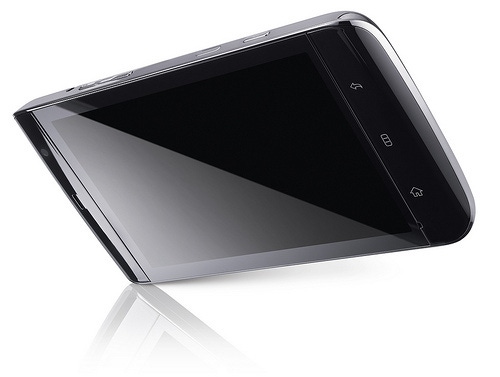One of the little gizmos floating around CES 2010 this year was the Dell Mini 5. It's not a netbook like the Mini 9, but a touch-screen tablet, of sorts. While 5 inches seems a little small for the tablet, it's got some interesting potential. Read on to see how Dell is adapting to some new trends in the Linux world -- even as the PC giant balances its Windows 7 relationship with Microsoft.
January 20, 2010

 One of the little gizmos floating around CES 2010 this year was the Dell Mini 5. It’s not a netbook like the Mini 9, but a touch-screen tablet, of sorts. While 5 inches seems a little small for the tablet, it’s got some interesting potential. Read on to see how Dell is adapting to some new trends in the Linux world — even as the PC giant balances its Windows 7 relationship with Microsoft.
One of the little gizmos floating around CES 2010 this year was the Dell Mini 5. It’s not a netbook like the Mini 9, but a touch-screen tablet, of sorts. While 5 inches seems a little small for the tablet, it’s got some interesting potential. Read on to see how Dell is adapting to some new trends in the Linux world — even as the PC giant balances its Windows 7 relationship with Microsoft.
Electronista has a few interesting details on the Dell Mini 5. It’s got the same 1GHz processor as the Google Nexus One and a few other goodies, like two MicroSD slots and a hefty battery. Electronista also has the tear down of the actual device, so you can get your circuit-board excitement on. But the device won’t be running anything new from Redmond. Instead, it’ll be running Android OS (a modified version of 1.6), and support the addition of a SIM card. That means something roughly the size of an old-fashioned cell-phone can be your new PDA for everything. Dell is most likely aiming this to be an over-sized iPod touch of sorts.
But there’s another story here. Out of all the big-name main-stream computer makers, Dell, arguably, is making the most strides with trying to proliferate Linux in nearly every direction it can. They were some of the first companies to jump on board and start shipping Ubuntu with their machines. Plus, they just launched the Mini 3 in China, which is their Android Phone offering. Linux is everywhere while Microsoft…well…they’re kind of everywhere, but…
Here’s the thing. Windows 7 was supposed to be the second coming of Windows XP, and it was. It was what Vista should’ve been. It’s great, snappy, fast, responsive. All the things you want from an OS. But maybe, just maybe, it’s a tad too late. In the scant few years that Vista spread desolation and aggravation across many a user’s desktop, Linux alternatives — fast Linux alternatives — cropped up like wildfire. In fact, in just 4 short years of college (2005-2009), I heard the word ‘Linux’ go from geeky nomenclature, to nearly house-hold name.
What’s that all about?
The leaps and bounds coming from the Linux world– along with big backing by companies like Google — are bringing the open-source ideology into a more main-stream mind, while simultaneously supporting what people want to do with a computer. Web, text edit, e-mail, music, work: the salt of the silicon earth, so to speak, the basic group of computer users can find themselves working and playing just as they would in a Windows or OS X world, without all the lost Benjamins and without the fuss of compiling binaries and packages like the Linux of old.
So as Android / Ubuntu and other Linux derivatives march on and find cozy places on hard drives across the world, you might wonder — what will become of the idea of the operating system? It’s an old argument, nothing new: but with the trend moving towards cloud computing, operating system preferences might boil down to only a few handful of hardcore enthusiasts, while the rest of the world enjoys a free version of Ubuntu. (Okay, maybe. But it’s not impossible.)
So, is Dell leading a trend towards Linux being a big-name player? I think so. As much as the Year of Windows 7 is supposed to be the redemption of Microsoft’s sins, I think there’s already been too many converts.
About the Author(s)
You May Also Like


